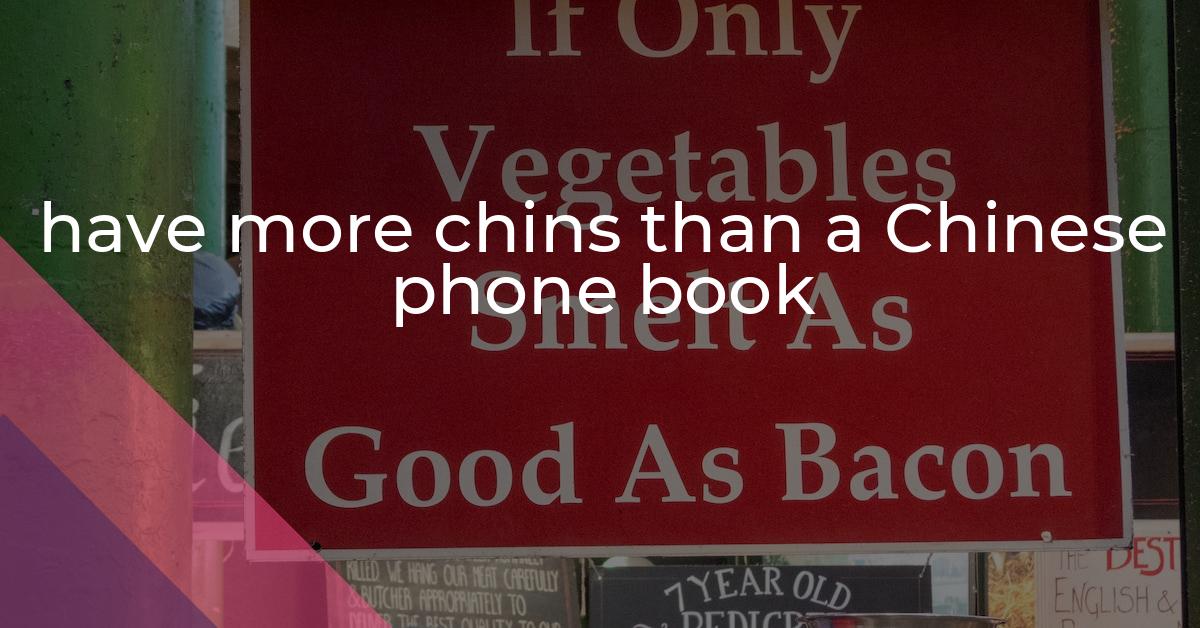have more chins than a Chinese phone book: Idiom Meaning and Origin
What does ‘have more chins than a Chinese phone book’ mean?
The idiom "have more chins than a Chinese phone book" refers to someone who is significantly overweight and has multiple rolls of fat on their neck or chin area.

Idiom Explorer
The idiom "more than you can shake a stick at" means having an overwhelming or excessive amount of something.
The idiom "lead with one's chin" means to put oneself at risk or in a vulnerable position by being outspoken or provocative.
The idiom "keep one's chin up" means to remain cheerful and optimistic in a difficult or challenging situation. It encourages maintaining a positive attitude and not allowing oneself to be discouraged or defeated by adversity.
The idiom "have more money than God" means to be extremely rich or wealthy beyond imagination.
An idiom meaning someone has an extremely unattractive or unpleasant face, often used to give a brutally honest description of someone's appearance.
The idiom "glass chin" is used to describe someone who is easily hurt, either physically or emotionally, and cannot handle criticism or difficult situations well.
The idiom "German goiter" is used to describe someone who talks too much. It originated from the stereotype that Germans have large necks, indicating a potential connection to excessive talking.
The idiom "fill one's face" means to eat a large amount of food quickly and greedily.
The idiom "fat of the land" means to enjoy the best or richest things in life, often referring to an abundance of food or wealth.
Chins Galore
The idiom "have more chins than a Chinese phone book" is a vivid and humorous expression that describes someone who is overweight or has a double chin. While its origin is uncertain, it likely emerged during a time when phone books were common reference tools and China had a large population. The idiom may have been influenced by stereotypes or the perception of long phone books in China due to the high number of surnames. However, it is important to be mindful of the potential implications and impact of using such idioms, as they can perpetuate stereotypes and contribute to discrimination.
One related idiom that comes to mind is "Chinaman on one's back". This idiom is used to describe a burden or problem that weighs heavily on someone. It suggests that the burden is comparable to having a person of Chinese descent on one's back. While this idiom may not be as commonly used or recognized as "have more chins than a Chinese phone book", it provides another example of how Chinese culture has influenced idiomatic expressions in the English language.
Another related idiom is "Chinaman's chance". This idiom is used to describe a slim or unlikely chance of success. It reflects the stereotype of Chinese people facing significant challenges or discrimination in various contexts. While the use of this idiom may be considered outdated or offensive by some, it offers insight into the historical perspectives and biases associated with the Chinese community.
It is worth noting that idioms can vary in meaning and usage across different cultures and societies. This particular idiom may not be widely recognized or understood by individuals outside of certain English-speaking regions. Therefore, it is crucial to consider the context and audience when using or interpreting idioms.
When editing articles, it is essential to adhere to the rules and guidelines set forth by the AP style. These rules ensure that the articles are clear, concise, and effective in communicating the intended message.
One key aspect of editing is removing the need for introductory or summary paragraphs. By getting straight to the point, the content becomes more engaging and impactful for the reader.
Additionally, transitional phrases should be removed to improve readability. This allows the paragraphs to flow smoothly and prevents the reader from getting distracted.
The paragraphs should be kept short, consisting of 2-3 sentences. This makes the content easier to digest and enhances overall clarity.
Using short sentences is another effective way to improve readability. It allows the reader to absorb the information quickly and prevents confusion.
The use of simple words and phrasing is essential for maintaining a conversational style. This makes the content more accessible and relatable to a broader audience.
Writing in a friendly and informal tone helps to establish a connection with the reader. It creates a sense of familiarity and encourages engagement with the content.
Varying the language in each paragraph adds interest and prevents the article from becoming monotonous. This encourages the reader to continue reading and maintains their attention.
Avoiding the repetition of phrases is crucial for keeping the content fresh and engaging. It prevents redundancy and enhances the overall flow of the article.
Restructuring sentences and paragraphs is an effective way to improve readability. By organizing the content in a logical and cohesive manner, the article becomes easier to follow.
When editing, it is important to consider the target audience, which in this case, is a well-informed audience. The content should be tailored to their level of knowledge and understanding.
Example usage
Examples of how the idiom "have more chins than a Chinese phone book" can be used in a sentence:
- She may be overweight, but her pet cat has more chins than a Chinese phone book.
- My grandfather's double chin is so prominent that he could have more chins than a Chinese phone book.
- When I laugh, my cheeks puff out, and I feel like I have more chins than a Chinese phone book!
More "Appearance" idioms



